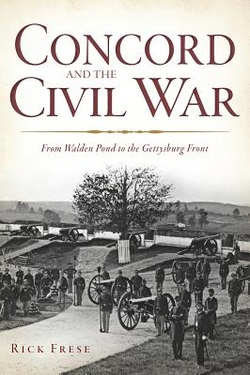
Rick Frese
The History Press, 2014, 128 pgs.
ISBN: 978-1-62619-294-2
Image courtesy of Concord Bookshop
When many think of the town of Concord, Massachusetts, our minds generally move directly towards the American Revolution where the Patriot forces faced off against the might of the British Army. Or we think of authors such as Alcott and Hawthorne. While both are great moments in the history of the country, the town of Concord contributed greatly to the American Civil War. In his work on Concord and the Civil War, Rick Frese has compiled a history of the town and what their contributions were to the War Between the States. What is truly amazing is the amount of information placed in this work and the people who served both on the battlefield and the home front.
Rick Frese is a veteran of the United States Army and chaired the Concord 350th Anniversary Committee. He is a professor of government and sociology at Bently University and has been a political commentator in both print and screen. He also received the President’s Award for Teaching Excellence at Bently University and is semi-retired.
While most work on towns in the Civil War give a detailed analysis on what the units from the town did in the war, Frese adds something a bit more to the mix. While talking about the deeds of the units, he also talks about the home front and the people who lived there. From Emerson to Hawthorne to Alcott and Thoreau, the authors of the Concord area had a great significance on the war effort, a point he makes clearly throughout the text. He also states that the Concord people did not shirk from the war effort and when the threat of a draft reared its ugly head, the people responded that it would comply. Throughout his narrative, Frese shows the contributions from home sent to the soldiers and the cost of the supplies they were given. These details of what it was like at home brings about more of an appreciation for those who could not serve in the war. One of the most powerful parts of the narrative was his chapter on the Melvin Brothers and the monument erected to them in Sleepy Hollow Cemetery. These three brothers died in many different ways, be it from disease to battle wounds to imprisonment in Andersonville, the details of their lives and service are both honorable and haunting. The entries of the journal from Andersonville prison are not for the squeamish readers. Some of the writings are very disturbing from Samuel Melvin. The fourth Melvin brother was the one who dedicated his life to erect the monument and to ensure that the memory of his brothers lived on.
Rick Frese has given us something here which is unusual for the Civil War audience but works in a way that brings about a beautiful narrative. He has not only brought the battlefield experiences of the Concord soldiers to life, but the home experience as well. This narrative should be celebrated as a great contribution to Civil War research with hopes that Frese can give us another work about Concord and its impact on society. Not many realize what one town can do for the country. Here, in Concord and the Civil War, Frese shows us that one small town can make a difference in the larger pictures of American History.
 RSS Feed
RSS Feed
